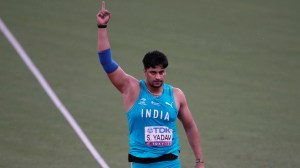Roadmap for India drawn at ITER meeting in China
India’s route to the prestigious International Thermonuclear Experimental Reactor (ITER) project is becoming clear.As the joint explora...

India’s route to the prestigious International Thermonuclear Experimental Reactor (ITER) project is becoming clear.
As the joint exploratory team that had recently visited India presented its report in Chengdu, China, the assembled ITER delegates chalked out a ‘‘series of steps’’ that will pave the way for India’s participation.
The feedback was positive as delegates from China, US, European Union, Japan, Korea and Russia did not raise any major objections to India’s scientific and technical capabilities for becoming a part of this fusion reactor project.
After the week-long meeting, it was disclosed that the ITER delegates have agreed on ‘‘a series of steps for the near future leading towards a possible agreement among all parties to India’s accession’’.
While it is still not clear what these steps would entail, indications are that the details of the Indian contribution have to first be worked out.
In a letter on July 11 expressing Indian interest to join the project, Anil Kakodkar, Chairman of Atomic Energy Commission, had stated that India is looking to make a substantial contribution in kind given its own research in the area of fusion technology.
Sources, however, indicated that New Delhi is keen on joining the project and will look positively at meeting any particular requirement that may have been identified.
Helping India become a part of the ITER project was one of the commitments Washington had made in the July 18 Indo-US joint statement.
The willingness on the part of member countries to include India is also being seen as a major step in the direction of ending India’s isolation from the cutting edge nuclear research underway in the world. New Delhi is also keen to join the US-led Generation-IV reactor programme.
After Kakodkar’s letter — sent just before Prime Minister Manmohan Singh’s visit to Washington — that laid out India’s case, the ITER member states met in September at Cadarche, France, and decided to send a joint exploratory team to India. The team was here earlier this month and visited sites where research related to fusion reactors are being carried out.
Energy priority: Natwar
Moscow: External Affairs Minister Natwar Singh said that India would actively cooperate with the Shanghai Cooperation Organization (SCO) to ensure security and stability, fight terrorism and foster economic cooperation in the region. He also proposed energy cooperation as a priority sector. He welcomed the India-Pakistan-Iran and Turkmenistan-Afghanistan-Pakistan pipelines. —ENS
Photos



- 01
- 02
- 03
- 04
- 05




























